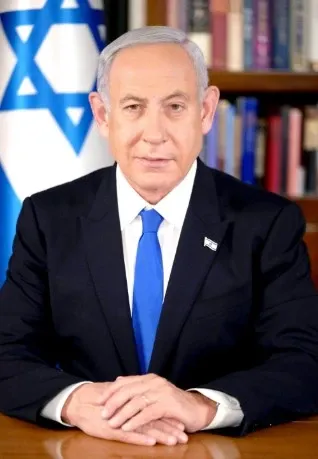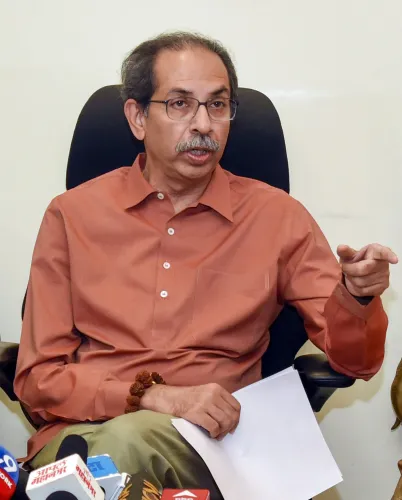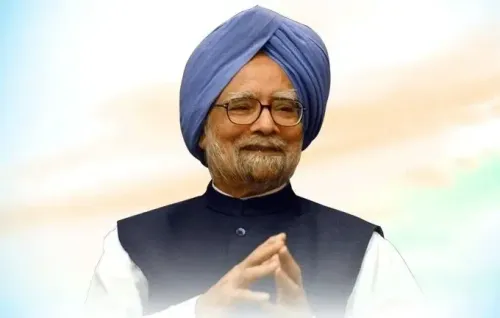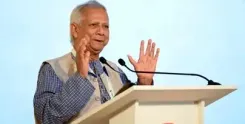What prompted Israel to denounce France's recognition of a Palestinian state?

Synopsis
Key Takeaways
- Netanyahu condemned France's recognition of Palestine.
- Macron's decision aligns with France's commitment to Middle East peace.
- At least 142 countries recognize Palestine.
- Israel's occupation and settlement expansion pose challenges.
- International dialogue on Palestinian statehood is intensifying.
Jerusalem, July 25 (NationPress) - The Prime Minister of Israel, Benjamin Netanyahu, has expressed his strong disapproval of French President Emmanuel Macron's recent move to formally recognize a Palestinian state.
On Thursday night, Macron took to the social media platform X, stating, "In line with its longstanding commitment to achieving a just and enduring peace in the Middle East, I have chosen to recognize the State of Palestine."
Macron further indicated that he would make this "solemn declaration" prior to the upcoming 80th session of the United Nations General Assembly, as reported by the Xinhua news agency.
Netanyahu's office commented shortly after, asserting, "This action rewards terrorism and poses a threat of creating another Iranian proxy, similar to what occurred with Gaza."
Additionally, Netanyahu remarked, "Establishing a Palestinian state under these circumstances would serve as a launchpad for efforts to destroy Israel, rather than fostering peaceful coexistence."
Israeli Foreign Minister Gideon Sa'ar stated, "A Palestinian state would effectively become a Hamas state, akin to how the withdrawal from the Gaza Strip two decades ago enabled Hamas's takeover there."
Macron's announcement follows a previous commitment made in April, where he stated that France would recognize Palestine during an international conference on the subject, which he co-chaired with Saudi Arabia in New York last June.
Despite this, the conference faced postponement until the end of July due to pressures from the United States.
This recognition positions France as the largest and possibly most influential European nation to acknowledge a Palestinian state, joining other European Union members like Norway, Ireland, and Spain, who have also indicated similar intentions.
Out of the 193 member states of the UN, at least 142 countries currently recognize or plan to recognize a Palestinian state, while several prominent Western nations, including the US, UK, and Germany, have refrained from doing so.
The timing of this announcement coincides with rising European discontent regarding Israel's actions in Gaza, where a reported 59,587 Palestinians have been killed and severe restrictions on aid have led to a humanitarian crisis.
Recently, France, along with the UK, Australia, Canada, and 21 other allies of Israel, condemned the restrictions on aid deliveries to Gaza and the deaths of hundreds of Palestinians attempting to access food supplies.
This joint declaration marked one of the most significant stances taken by Western nations, emphasizing that the conflict "must conclude immediately."
Macron had previously expressed his determination to acknowledge the state of Palestine, and France's Foreign Minister is set to co-host a UN conference next week focused on a two-state solution to the long-standing conflict.
The UK government also announced that Prime Minister Keir Starmer plans to coordinate with allies France and Germany in an urgent phone discussion regarding the situation in Gaza on Friday.
Starmer emphasized that achieving a ceasefire in Gaza would "set us on a path towards recognizing a Palestinian state and establishing a two-state solution that assures peace and security for both Palestinians and Israelis."
In the wake of Israel's military actions, numerous countries, particularly in the Middle East and Africa, have expressed solidarity by recognizing Palestine, a trend that has accelerated since the onset of the conflict following Hamas's assault on southern Israel on October 7, 2023.
However, significant challenges remain regarding the establishment of a future Palestinian state.
Israel continues to occupy Palestinian territories, including East Jerusalem, which is widely regarded as the future capital of a Palestinian state.
The Israeli government has undertaken significant expansion of settlements deemed illegal under international law throughout the occupied West Bank, which rights advocates have described as a form of de facto annexation.
Earlier this week, Israel's Parliament approved a symbolic measure explicitly advocating for the annexation of territories seized during the 1967 conflict with Egypt, Jordan, and Syria.
Netanyahu's office condemned Macron's announcement, arguing, "Such a move rewards terror and risks creating another Iranian proxy, similar to Gaza."
Netanyahu's statement emphasized that a Palestinian state, under current conditions, would serve as "a launchpad to annihilate Israel."
Israeli Defence Minister Israel Katz referred to the recognition as "a disgrace and a capitulation to terrorism," asserting, "We will not permit the establishment of a Palestinian entity that threatens our security, endangers our existence, and undermines our historical rights to the Land of Israel."










